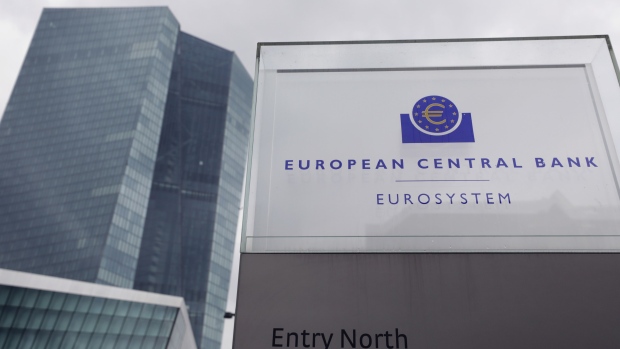Dec 9, 2021
ECB Studies Pandemic Tool Tweak to Use in Future Market Turmoil
, Bloomberg News

(Bloomberg) -- The European Central Bank is studying whether to tweak how it reinvests its emergency bond purchases to help countries weather future moments of market turmoil, according to officials with knowledge of the matter.
The Governing Council could expand the period of time in which it rolls over maturing securities and apply more flexibility to the geographic allocation of such buying in the so-called PEPP measure, said the people, who spoke on condition of anonymity as such discussions are confidential.
They added that no decisions have been taken. An ECB spokesman declined to comment on future determinations by policy makers.
Such a move might address the concerns of Governing Council members on the need to have a tool available to use in times of market stress after the experience of the pandemic forced them into creating PEPP.
Tweaking that program could be one among a number of decisions the Governing Council considers as it ponders the future of stimulus after the scheduled end of net emergency purchases in March. Its Dec. 16 meeting has been slated as a key moment to determine the parameters of bond-buying.
Maturing debt held in the PEPP is currently slated to be reinvested until at least the end of 2023, according to the rules governing the program.
German and Italian bonds extended their advance, sending corresponding yields 4 basis points lower to minus 0.35% and 0.98% respectively, while money markets held wagers steady that the ECB will hike interest rates 10 basis points by December next year.
Greek Ineligibility
A tweak to the tool could prove a consolation for Greece. Its ambition to become eligible for conventional quantitative easing is likely to be dashed, the people said.
The country’s exclusion from the ECB’s normal stimulus tool, the Asset Purchase Program, dates from its inception. The measure sets minimum levels for credit ratings that Greece has yet to meet, a rule reflecting the overarching requirement as set out in the European Union treaty to avoid monetary financing.
Interviewed by Bloomberg Television in October, Bank of Greece Governor Yannis Stournaras cited “very substantial progress” in its economy and said its possible inclusion in the APP would be discussed in due course by the Governing Council.
“It’s true that Greece does not have investment grade yet, but I’m sure that if we didn’t have the pandemic, investment grade in Greece would have been restored,” he said then.
(Updates with market reaction in seventh paragraph.)
©2021 Bloomberg L.P.